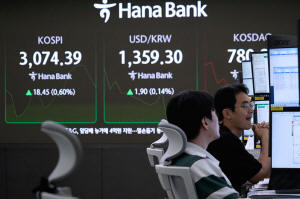Asian shares are mixed after US stocks hit an all-time high
[June 30, 2025] By
ELAINE KURTENBACH
BANGKOK (AP) — Asian shares started the week with gains after U.S.
stocks closed at an all-time high following their recovery from the
shocks of the Trump administration’s trade policies.
Canada's decision to cancel a plan to tax U.S. technology firms that had
led President Donald Trump to halt trade talks helped to steady the
markets. U.S. stock futures advanced after Canadian Prime Minister Mark
Carney said the talks had resumed.
In Tokyo, the Nikkei 225 climbed 0.8% to 40,487.39.
Hong Kong's Hang Seng lost 0.3% to 24,084.20, while the Shanghai
Composite index advanced 0.6% to 3,444.43.
China reported that its factory activity improved slightly in June after
Beijing and Washington agreed in May to postpone imposing higher tariffs
on each others’ exports, though manufacturing remained in contraction.
In South Korea, the Kospi gained 0.5% to 3,071.70. Australia's S&P/ASX
200 rose 0.3% to 8,542.30.
Taiwan's Taiex lost 1.4% and the Sensex in India was down 0.6%. In
Bangkok, the SET gained 0.4%.
On Friday, the S&P 500 rose 0.5% to 6,173.07, above its previous record
set in February. The key measure of Wall Street’s health fell nearly 20%
from Feb. 19 through April 8.
The Nasdaq composite gained 0.5% to 20,273.46, its own all-time high.
The Dow Jones Industrial Average rose 1% to 43,819.27.

The gains on Friday were broad, with nearly every sector within the S&P
500 rising. Nike soared 15.2% for the biggest gain in the market,
despite warning of a steep hit from tariffs.
An update on inflation Friday showed prices ticked higher in May, though
the rate mostly matched economists' projections.
Inflation remains a big concern. Trump's on-again-off-again tariff
policy has made it difficult for companies to make financial forecasts
and strained household budgets. A long list of businesses from carmakers
to retailers have warned that higher import taxes will likely hurt their
revenues and profits.
The U.S. has 10% baseline tariffs on all imported goods, along with
higher rates for Chinese goods and other import taxes on steel and autos
and the threat of more severe tariffs continues to hang over the
economy. The current pause on a round of retaliatory tariffs against a
long list of nations is set to expire on July 9. Failure to negotiate
deals or further postpone the tariffs could once again rattle investors
and consumers.
[to top of second column] |

Currency traders watch monitors near a screen showing the Korea
Composite Stock Price Index (KOSPI), top left, and the foreign
exchange rate between U.S. dollar and South Korean won, top center,
at the foreign exchange dealing room of the KEB Hana Bank
headquarters in Seoul, South Korea, Monday, June 30, 2025. (AP
Photo/Ahn Young-joon)
 In an interview with Fox News
Channel’s “Sunday Morning Futures,” Trump said his administration
will notify countries that the trade penalties will take effect
unless there are deals with the United States. Letters will start
going out “pretty soon” before the approaching deadline, he said.
The Federal Reserve is monitoring the tariff situation with a big
focus on inflation. The rate of inflation has been stubbornly
sitting just above the central bank's target of 2%. In a report
Friday, its preferred gauge, the personal consumption expenditures
index, rose to 2.3% in May. That's up from 2.2% the previous month.
The Fed cut interest rates three times in late 2024 following a
historic series of rate hikes to cool inflation. The PCE was as high
as 7.2% in 2022 while the more commonly used consumer price index
hit 9.1%.
The Fed hasn't cut rates so far in 2025 over worries that tariffs
could reignite inflation and hamper the economy. Economists still
expect at least two rate cuts before the end of the year.
Bond yields held relatively steady. The yield on the 10-year
Treasury fell to 4.25% from 4.27% late Friday. The two-year Treasury
yield, which more closely tracks expectations for what the Federal
Reserve will do, stood at 3.73%.
In other dealings early Monday, U.S. benchmark crude oil lost 31
cents to $65.21 per barrel. Brent crude, the international standard,
gave up 20 cents to $66.60 per barrel.
The U.S. dollar fell to 144.06 Japanese yen from 144.46 yen. The
euro fell $1.1722 from $1.1725.
All contents © copyright 2025 Associated Press. All rights reserved
 |